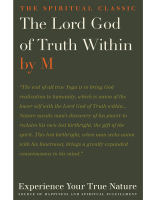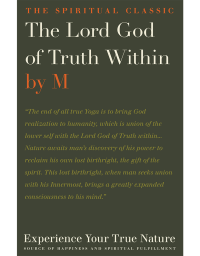In the practice of Yoga we often make discoveries which startle us. Seeking union with nature the student begins to make contact with those fixed principles which exist in nature’s environment (natural law), and he discovers that when he aspires for union with the Lord God of Truth within, his “natural man,” through the consciousness of nature, begins to ally himself with his human mind. He begins to forge a link of union between the elemental man (nature’s counterpart) within himself and the human individual as we know him, and he seeks to establish his sun and moon nature.
At the baptism of Jesus with water by John the Baptist, the union of the human and the natural man was accomplished, and early Christianity called this the “descent of the Holy Ghost.”1 It was by this union with nature’s consciousness that Jesus, having command of nature’s will, was able to perform miracles.
When we consciously travel out of our body we perceive the splendor and brightness of the light about us, and sometimes we hesitate and look back at our physical body, as we would look at a curiosity, for we look at it now from a very different viewpoint. We see ourselves as others see us, and we are surprised to realize how indifferent we feel towards our physical body. Out of the body we are free, and can travel with great speed to any place we desire. We are alive to what is going on in the different atmospheres through which we pass, but reentering our body is like passing from light into darkness and oblivion for a time. We then find, however, that we have no longer fear of death, as taught in childhood, and we are fully conscious of the elemental side of our being; but on reentering our body this seemingly disappears.
The world little realizes the brilliancy of those adepts from many nations who work out of their bodies for the welfare of their own country. At the present time there are many men, connected with the staffs of certain armed nations, who are brilliant in their work of espionage. Out of the body they discover the hidden arsenals of a nation, and can inform themselves of the latest inventions. But there is a law regarding such activity and our world is overshadowed by the great immortal beings who watch over its development. They do not allow the destructive forces to crush out the well-being of the youthful inhabitants.
Yet the world must be allowed to suffer until nation shall call to nation in love. It is only through the experience of suffering that man can be brought to realize that nature’s laws cannot be broken with impunity. Man, through ignorance, constantly breaks nature’s commandments, until through suffering he seeks to obey her great command to “Be honest, with yourself and others!” Until man practices honesty between man and man, he will suffer the scourge of nature’s flail upon his flesh.
The Indians were far wiser than the white man, for they did not recklessly destroy. The early white settlers exterminated the buffalo, and dug up the buffalo grass to plant wheat. Today nature has taken her revenge, for famine and drought have ensued, owing to the transference of alien wheat into alien soil, which nature had intended to be planted with buffalo grass in order to conserve water. The roots of the buffalo grass went 18 inches deep into the soil, and thus found nourishment through dry spells, while wheat penetrates only about four inches and is destroyed.
Men of science have prophesied that unless something is done, parts of America will be a desert within two hundred years, but they do not tell us how to avoid this. The answer must be found by contacting nature. When we aspire to the God of Truth through nature, she begins to build around us a shield of protection, and this brings about a union of consciousness between nature and man.
The Yogi is aware of the fact that he is a part of nature, and that she lives, moves, and has her being within him, and he slowly comes to comprehend her movements and intelligence. There is more than most people are conscious of in the phrase, “close to nature.” The man who lives close to nature is the natural man, and when we meet him we find that he possesses something which had hitherto escaped our observation. These men are gentle, yet strong, contemplative, yet active in their movements, and there exists in them a harmony and a natural understanding of things which the city man does not possess.
We also find these characteristics in those who live on or near the sea. I have found culture in the hut of a Cape Cod fisherman, and among the shepherds and weavers of the Highlands of Scotland. Often these people are a challenge to one’s intelligence.
As a boy I lived in the farming community of Concord, Massachusetts, gathered mushrooms in Emerson’s front yard, and listened to the friends of Emerson and Thoreau relating anecdotes. These people were dear, cultured men and women of nature, living in an atmosphere impregnated with thought. As a boy I once told my uncle that I had read Thoreau’s books, but could not understand how he could possibly live on twenty-five dollars a year. My uncle answered that when he went on Sunday afternoons with Emerson to see Thoreau at Walden Pond, they always took him a basket of good things. Thoreau was an example of a man who had partly unified himself with nature’s consciousness. Walt Whitman was another.







